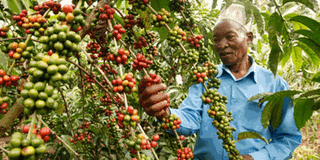Mixed reactions greet plans for coffee plant

A farmer admires his ripe coffee beans. Government says adding value to coffee could see the country earn more from the sector. PHOTO / FILE
What you need to know:
- The development has cast a chill over some players given that UDCA offered its backing to a coffee agreement that the government entered into with Uganda Vinci Coffee Company.
The Uganda Coffee Development Authority’s (UCDA) move to enlist a private company to set up a coffee soluble plant has been greeted with mixed reactions by players in the coffee sub-sector.
UDCA is a government agency that says its mandate is to “regulate, promote and oversee the quality of coffee along the entire value chain, support research and development, promote production, and improve the marketing of coffee in order to optimise foreign exchange earnings for the country and payments to the farmers.”
The agency ran an advert in the government-owned New Vision newspaper on July 14, calling for expression of interest for the provision of transaction advisory services for the establishment of a soluble coffee processing plant in Uganda under a public-private partnership. Sealed bids will have to be submitted on August 25.
The development has cast a chill over some players in the coffee sub-sector given UDCA’s past track record.
The government agency offered its backing to a coffee agreement that the government entered into with Uganda Vinci Coffee Company (UVCC) early this year.
On April 26, UCDA’s executive director Dr Emmanuel Iyamulemye told lawmakers on the House’s trade committee that the agreement did not contravene any provisions of the Coffee Act and that it is a “good deal” for Uganda’s coffee sub-sector.
The trade committee eventually red flagged the deal that gave UVCC a range of sweeteners such as free land and tax holidays to process Uganda’s green beans.
Controversy brewing?
Players in the coffee sub-sector are now interpreting UDCA’s July 14 advert as a classic case of moving the goalposts.
Mr Nandala Mafabi, the chairperson of Bugisu Cooperative Union, told Sunday Monitor that any attempts by the government to move the goalposts will be met with resistance.
“If they are bringing a plant for soluble coffee, every coffee producing region should have one. If they come with an idea of giving one person, we will object to it,” Mr Mafabi, who is also a legislator for Budadiri West, said.
He added that it will be instructive for UCDA to consider a soluble plant for every coffee type.
Uganda produces Arabica coffee, which shares 20 percent of the annual national coffee production, and Robusta coffee, which contributes 80 percent of the coffee produced in the country annually.
The allegation of a possible change of tack from the government gained traction after Mr Robert Kabushenga, a coffee farmer, used a tweet that annexed the advert to expressly state that there is something sinister in the pipeline.
“Uganda Coffee Development Authority will pretend to set up a processing facility then hand it over to Vinci. Deal done! It will end the same way as previous false promises like sugar, fruit, hides, AGOA (textile), fertiliser factories,” Kabushenga wrote.
“How did they say it was a good deal, and now they are looking for an advisor? On what basis did they settle it was a good deal?” Mr Steven Kisira asked, adding: “And now they are saying we need to go and find out how to do a soluble coffee plant with a third party!’’
The UDCA website indicates that it has —together with Uganda Development Corporation (UDC)—received funds from the government “for the acquisition of the consultancy services.”
The services will focus on comprehensive feasibility study, preparation of transaction documents and providing support to UCDA during the procurement of the private party.
On Wednesday, Dr Iyamulemye appraised President Museveni about UCDA’s plans during a national address. “UCDA together with UDC, the investment arm of government, are going ahead with a soluble coffee plant. We have a committee headed by Ramathan Ggoobi (Secretary to the Treasury) and Ministry of Finance has approved the concept,” Dr Iyamulemye told President Museveni, adding: “We want Ugandans to have shares in the plant and interest others abroad to invest with government.”
Dr Iyamulemye defended UCDA’s move, saying “the company can help us in marketing Uganda coffee abroad because they know the external markets better than us.”
He also said a move to add value to Uganda’s green beans could see the country earn “13 times if we combine this with roast & ground coffee.”
Speaking to Sunday Monitor about UCDA’s latest plans, Mr Amos Kasigi from the Uganda Quality Coffee Traders and Processors Association said engagements with UCDA are welcome.
He added that bottlenecks that deter Uganda from processing its green beans cannot be wished away.
“Let them come and explain to us. We want to upgrade, but we have to address the existing bottlenecks, the costs to set up a soluble plant. We have to look at issues of markets, we have to look at volumes to roast, after roasting then what,’’ Mr Kasigi said.
Defying the odds
UCDA’s June report captured a growth in Uganda’s coffee exports despite consecutive failed rainy seasons in coffee-growing areas and a change in tack following the withdrawal from the International Coffee Organisation (ICO).
The report showed that the volume and value of the country’s coffee exports increased in the past 12 months from 6.08 million 60kg bags worth $559.16m (FY 2020/2021) to 6.25 million 60kg bags worth $862.28m (FY 2021/2022).
“Coffee prices are high because Brazil, the largest coffee producer in the world, was hit by frost,” Dr Iyamulemye said on Wednesday, adding:“Our production is also going up because the seedlings which we distributed to farmers with support from Operation Wealth Creation are now in production and the volumes have gone up.”
The latest statistics from UCDA show that Europe remains the preferred destination for Uganda’s coffee.
The continent accounts for 65 percent of the import receipts, with Italy (40 percent) and Germany (13 percent) accounting for the vast bulk of the market share.
“Ugandan coffee farmers need to produce knowing that there is market…but most importantly, we want to create more jobs for Ugandans [in the coffee value chain],” Dr Iyamulemye told President Museveni last week.
The UCDA top official also moved to set the record straight on current developments, saying: “We are not bringing the other company (UVCC) through another window. We are encouraging everyone to take interest in this because all we want is to have a soluble coffee plant.” The doubting Thomases, however, remain unconvinced.





